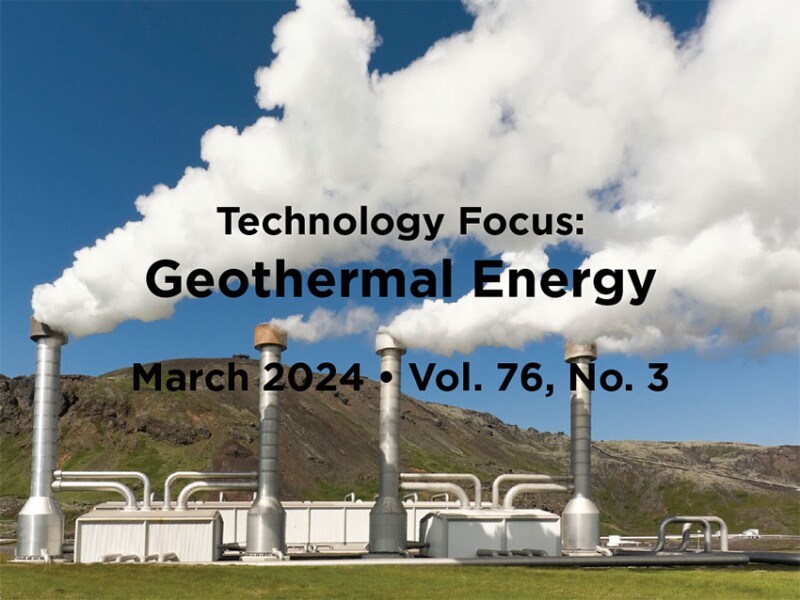As the world seeks transformative solutions to ensure a sustainable energy future, there is a growing interest in geothermal energy because of its versatility and evolving technologies that enable the application of low-enthalpy fluids. One area where the untapped potential of geothermal energy has been realized is in harnessing thermal energy from abandoned or inactive oil and gas wells. Such wells could be exploited for electricity generation or direct use through well repurposing. Three innovative papers elucidate the challenges, complexities, applicability, and key operational considerations associated with repurposing abandoned or idle oil and gas wells for geothermal energy.
The first paper offers a comprehensive overview of 20 case studies from various countries, including actual and simulated cases. Downhole and surface parameters, including production scenarios, heat exchangers, circulation fluids, and power-generation efficiency, are meticulously examined. The investigation concludes with a positive outlook, highlighting the potential of producing geothermal energy from underused oil and gas wells.
The second paper delves into the technical and economic feasibility of repurposing oil and gas wells specifically for community heating through geothermal energy. The multidisciplinary approach involves a thorough analysis of physical, technical, economic, and environmental aspects. The results showcase the potential benefits of repurposing low-temperature wells for community heating, emphasizing the cost-effectiveness and sustainability of this approach.
The third paper introduces a geothermal assessment project conducted in an operational high-pressure/high-temperature field on the UK Continental Shelf. This innovative project uses a novel integrated work flow to assess the geothermal energy potential of offshore oil and gas assets and provides insights into CO2 emission reduction.
The life of oil and gas wells can be extended through repurposing for geothermal energy production. The findings underscore the technical viability, economic feasibility, and environmental benefits of oil and gas well repurposing, providing a promising avenue for transforming existing oil and gas resources and infrastructure into contributors to a cleaner and greener energy future.
This Month’s Technical Papers
Study Explores Retrofitting Abandoned Petroleum Wells for Geothermal Production
Study Outlines Challenges of Repurposing Oil and Gas Wells for Geothermal Applications
Technical Framework Assesses Offshore Geothermal Opportunities in Existing Assets
Recommended Additional Reading
SPE 213068 A Robust Screening Tool To Repurpose Hydrocarbon Wells to Geothermal Wells in Oklahoma by Esteban R. Ugarte, University of Oklahoma, et al.
SPE 215554 A Feasibility Study of Geothermal Energy Extraction in the Baram Basin, Sarawak, Using Numerical Reservoir Simulation Based on Analog Data by M. Bataee, Curtin University Malaysia, et al.
SPE 212075 Geothermal Energy in the Caspian Region: Study of Heat-Extraction Methods From Deep Wells by Dmitriy Abdrazakov, SLB

Rita Esuru Okoroafor, SPE, is an assistant professor at Texas A&M University, specializing in applying oil and gas skills and techniques to address challenges associated with low-carbon energy technologies. Before joining Texas A&M, she was a principal reservoir engineer at SLB, an organization she worked with for 13 years. During Okoroafor’s tenure, she contributed her expertise to different product lines and locations, covering various aspects of the oil and gas industry value chain. Her current research encompasses geothermal reservoir engineering, carbon dioxide storage and use, geologic storage of hydrogen, natural hydrogen, and reservoir geomechanics. By exploring these domains, Okoroafor aims to unlock new possibilities for sustainable energy sources and improve the understanding and management of crucial energy resources. She is an author of several technical papers and holds two patents. Okoroafor was an SPE Distinguished Lecturer in the 2023–24 season. She holds a BEng degree in petroleum engineering from the University of Port Harcourt, an MS degree in petroleum engineering and project development from the Institute of Petroleum Studies, and a PhD degree with postdoctoral work in energy resources engineering from Stanford University.

